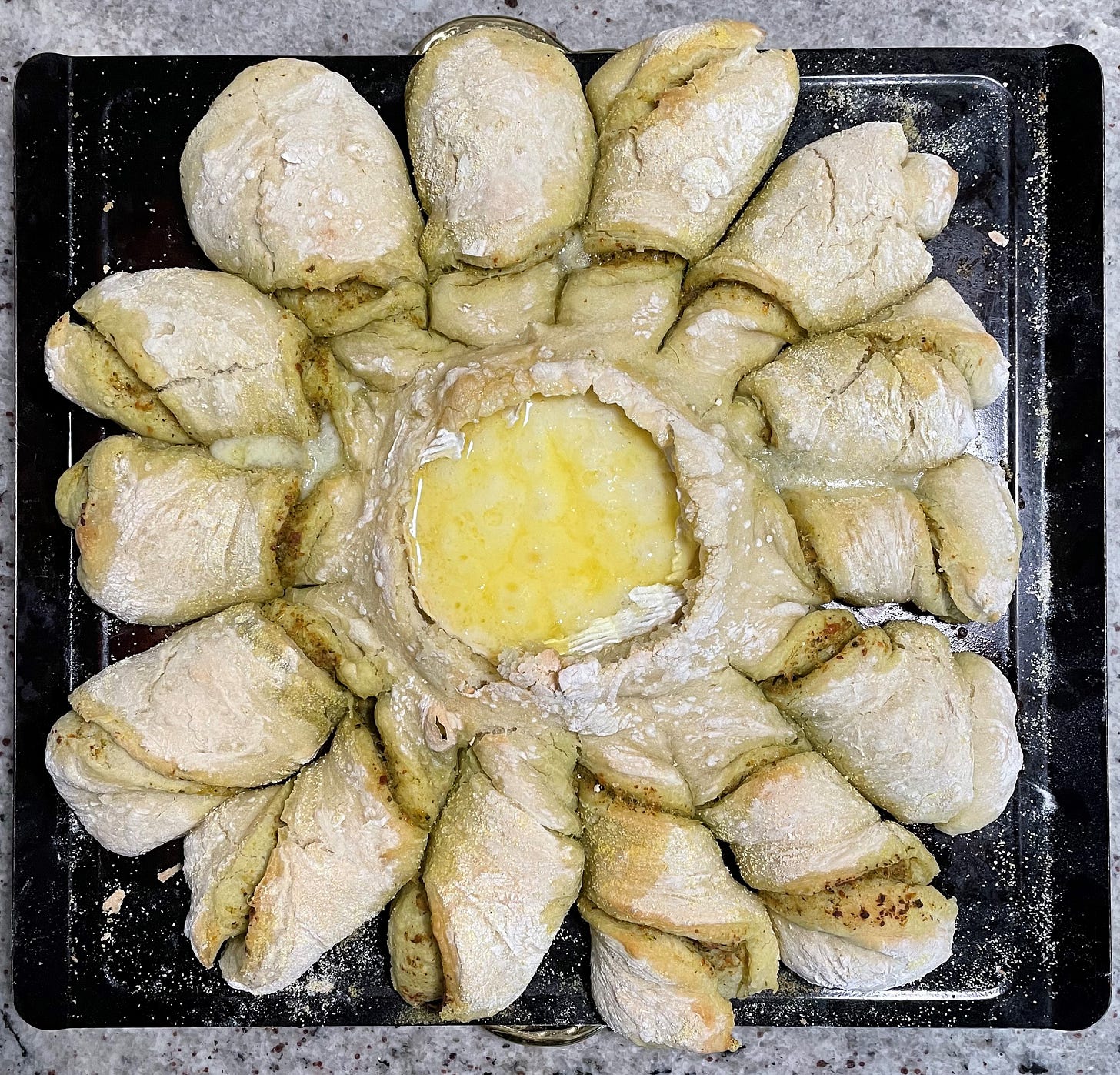Greetings from the University of New Hampshire! I hope you had a lovely Thanksgiving with your family and friends. We had a small one here at the LHH, but there was lots of good food, including a new personal favorite, baked brie with pesto twists.
I’ve been thinking a lot about priorities over the last couple of months. I shared Laura Vanderkam’s video about time management, and how you have to make time for the important things, and Clay Christianson’s video How Will you Measure Your Life? , in which he argued that things that really matter are relationships, and maintaining relationships requires making time frequently, often in small doses. I’m trying to really focus on those twin ideas in my professional and personal life - keeping them at front of mind as principles. Important things are often accomplished with small doses of steady work, relationships are the most important things, and it is necessary to make time for the small, steady doses of work for those important things.
This Thanksgiving I was reflecting on how grateful I am for my wife, because she does this very naturally. She isn’t distracted by a lot of shiny objects the way I am. She’s always focused on the important things - our family, and especially our children. She makes small investments in those relationships regularly. She texts each of our kids goodnight each night before she goes to bed, for example, so they know she is thinking of them. She doesn’t wait for a response, and doesn’t always get one. I don’t think that’s the same thing as helicopter parenting - she isn’t taking away their independence. She’s just reminding them that they are important. This is an example of a thing that takes almost no time, but makes it clear that they are a priority to her. She does a thousand things like this in a given week, and most of the time I think we all take it for granted. I’m grateful to have her in my life, and for her example.
Another quote popped up in my “memories” this week - this one I believe was related by Cicero, but I couldn’t verify that with Google. I’ll have to pull out my books and see if I can find the reference. Anyway - it is said:
Diogenes was eating lentils when a courtier saw him and said, "If only you would learn to flatter the prince, you wouldn't have to eat lentils." Diogenes looked at him and said, "If only you would learn to eat lentils, you wouldn't have to flatter the prince."
Some 2,500 years later, Thoreau said a similar thing in Walden: “A man is rich in proportion to the number of things he can afford to let alone.” It’s something to remember as I am writing this to you on Black Friday - the most materialistic day of the year. I’ve recorded another financial management video which I have included in the “watch” links below. This one is about banking and using checking and savings accounts. Pretty basic stuff, but, like I said, this series is meant for beginners. If you have a young person in your life, you might pass this link along.
And with Thanksgiving behind us, it is officially the holiday season! The first Christmas song I play every year is Bruce Springsteen’s rendition of Santa Claus is Coming to Town -
Enjoy the links!
(picture is from my paddle on Monday - it was 50’ish, so I decided to take the kayak out)
ooh - hey - you know what you could give someone for Christmas/Chanukah/Quanza/etc.? A free subscription to RWL!
Read
What: Newsweek, I'm a Black Ex-Felon. I'm Glad Kyle Rittenhouse Is Free, David Ben Moshe
Why: from the article -
I am cheering not despite the fact that many Black people in this country do not get fair trials. It's because of that: I want them to experience the same justice system that acquitted Kyle Rittenhouse. And now we have a standard to demand, one that is very public. The argument that Rittenhouse's acquittal is unjust because many Black people do not receive fair trials is saying that the only way to help the Black community is to hurt the white community. And that is a fallacy.
This is in the tradition of Martin Luther King, a demand for equality.
**
What: WaPo, I was an unhappy person. Here’s how I started peeling away my layers of anger.
Why: The author suggests keeping a pleasure journal. Oprah (watch, below) suggests a gratitude journal, but for the same reasons:
Mostly, though, the chief benefit I’ve noticed from keeping a journal of everyday pleasures is that it keeps enjoyment at the forefront of my thoughts. And when I’m focused on how to take joy from life, I do take more joy from it.
I’ve been keeping a journal for the last 18 months or so. Mostly I note events of the day. I may start to make a point to track things I feel grateful for.
**
Watch
What: Bonica, Personal Financial Management Basics - Banking (17 min)
Why: I have made a second video on personal financial management. This one addresses banking for short-term financial management and explains the difference between checking accounts and savings accounts. I then talk about why it’s a good idea to have multiple savings accounts, especially having an emergency fund.
**
What: Oprah, 20 Minutes for the NEXT 20 Years of Your LIFE (21 min)
Why: A quick quote -
“What you focus on in your life expands. So focusing on what you are grateful for increases positive vibrations and feelings of joy. Just one good feeling builds on another,and another, and if you actively appreciate all that you have in life, no matter how small it is, what you notice is that you end up having more. And when you hone in on what you don’t have, you never have enough.”
The whole thing is worth listening to.
**
Listen
What: Conversations with Tyler, David Rubenstein on Private Equity, Public Art, and Philanthropy (57 min)
https://cowenconvos.libsyn.com/david-rubenstein
Why: Great conversation about private equity and the economics of compensation, amongst a wide range of other topics. Connects back to my recent interview with Andrew Calkins who has been very involved with private equity in the healthcare space.
**
What: Persuasion, Andrew Yang on Why Democrats Are In Crisis (62 min)
Why: Former presidential candidate Andrew Yang is making the rounds promoting his new Forward Party. He’s been featured on a few of the podcasts I listen to, but I thought this one was the best. The most interesting thing he promotes is rank choice voting, which I have to look into more, but basically it reduces the all-or-nothing typical ballot process that favors a two-party system. It is how Glenn Youngkin apparently won the Republican nomination in the Virginia governor’s race, which he then went on to win. It seems to favor boring but effective candidates over noisy and flashy candidates. I like that in government. I prefer boring but effective politicians. I’ll find some stuff on rank-choice voting for a future RWL.
(FYI - if it sounds like I am down on the Dems, I am. But I’ve voted for more Dems than politicians of any other party, so it is more out of disappointment than team allegiance.)
Thanks for reading and see you next week! If you come across any interesting stories, won't you send them my way? I'd love to hear what you think of these suggestions, and I'd love to get suggestions from you. Feel free to drop me a line at mark.bonica@unh.edu , or you can tweet to me at @mbonica .
If you’re looking for a searchable archive, you can see my draft folder here: https://drive.google.com/drive/folders/1jwGLdjsb1WKtgH_2C-_3VvrYCtqLplFO?usp=sharing
Finally, if you find these links interesting, won’t you tell a friend?
See you next week!
Mark
Mark J. Bonica, Ph.D., MBA, MS
Associate Professor
Department of Health Management and Policy
University of New Hampshire
(603) 862-0598
mark.bonica@unh.edu
Health Leader Forge Podcast:
http://healthleaderforge.org
“The meaning of life is to find your gift. The purpose of life is to give it away.” – Pablo Picaso






